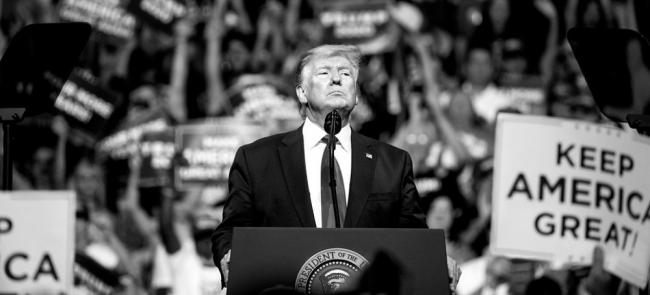Articles Menu

Jul 28, 2023
I’ve resisted using the word until now, but something menacing and novel is taking shape with the possibility of a second Trump term.
Fascism was most fully exemplified by the regimes of Benito Mussolini and Adolf Hitler. These regimes combined totalitarian dictatorship, wars of imperial conquest, and outright genocide in the case of Hitler (of Jews, Slavs, Roma) or ethnic mass murder in Mussolini’s case (of Libyans, Ethiopians, Slovenes). Placing Trumpism in the same category seemed to me trivializing and misleading.
I argued instead that Trump was more like Hungary’s Viktor Orbán or Turkey’s Recep Tayyip Erdoğan than Hitler or Mussolini, and should be categorized as an “illiberal populist” rather than a fascist. And in one very important respect, Trump differed sharply from the European fascists of the interwar period.
They were ardent militarists and imperialists. War was the crucible in which the new fascist man was to be forged; territorial expansion was both the means and the end of fascist power and triumph. Trump has shown little ambition to pursue such aims. In his first term, he shamelessly abased himself before Russian President Vladimir Putin, exchanged “love letters” with North Korea’s Kim Jong Un, signed the Doha Agreement with the Taliban committing the U.S. to withdrawal from Afghanistan, and petulantly sought to downgrade U.S. treaty obligations to NATO and South Korean allies that he deemed to be “delinquent” and getting a “free ride.”
Trump has continued in the same isolationist vein in recent interviews and speeches. He has railed against “globalists.” He has promised to settle the Russian-Ukrainian conflict in 24 hours by cutting off aid to Kyiv if President Volodymyr Zelensky does not reach an immediate settlement with Moscow—that is, capitulate to Putin. He has disparaged Taiwan as a predator nation that stole microchip manufacturing from the U.S. (That Chinese President Xi Jinping would construe the simultaneous abandonment of Ukraine and dismissal of Taiwan as anything other than a green light to invade the latter seems improbable.)
No question, Trump inflicted grave damage on our country’s political culture, stoking toxic polarization and reveling in dishonesty. And Trumpism did exhibit distinct elements of the fascist style of politics: the inflammatory rallies; the incessant mongering of fear, grievance, and victimization; the casual endorsement of violence; the pervasive embrace of conspiracy theories; the performative cruelty; the feral instinct for targeting marginalized and vulnerable minorities; and the cult of personality. But the Trump presidency lacked any warlike, expansionist interest, and that made it decisively unlike 20th-century fascism.
Thankfully, also, Trump himself was too lazy, inexperienced, and unprepared to set about systematically constructing a true dictatorship. The main focus of the Trump presidency was less plans and programs and more the theatrics of satisfying his constant, insatiable need for attention and adulation. Everything—whether the state of the economy or the chocolate cake served to China’s Xi Jinping at Mar-a-Lago—had to be extolled as “the greatest ever.”
Until the final weeks of Trump’s term, the guardrails of American democracy seemed to hold firm. The institutions of the federal government remained relatively intact, and civil servants largely secure and uncorrupted. The United States experienced democratic backsliding but not democratic collapse.
In a second term, however, a newly emboldened Trump could well attack democracy itself. The MAGA Republican Party of his making has openly explored ways to transform states where they control all branches of government. States that were once pluralistic democracies with at least some chance of a transfer of power are coming to resemble one-party regimes directed by a minority of the population. (Anne Applebaum’s report from Tennessee is a case history in point.)
In Florida, Governor Ron DeSantis, Trump’s putative rival for the 2024 Republican nomination, has turned his state into a laboratory for testing how a determined, calculating, uninhibited authoritarian can maximize executive power. In many respects, he has already accomplished at the state level what Trump did not have the discipline and focus to do at the federal level. And DeSantis has created a blueprint for other Republican state leaders to follow.
Just as state Republicans have become more ruthlessly autocratic in their methods, a new Trump presidency would be much more efficiently goal-oriented at the federal level. A huge transformation of the administrative state is being deliberately planned. The government agencies and civil service he has decried as the “deep state” would be purged or politicized, and the “retribution” he has promised against his enemies would also be carried out. The “unitary executive” theory long promoted by some Republicans would become the reality of an unabashed authoritarianism.
The very last months of the Trump presidency foreshadowed what a second term would entail. When formerly loyal vassals such as Attorney General William Barr and Defense Secretary Mark Esper demonstrated that they would not cross the line into unconstitutional insurgency, Trump sought sycophants for whom no such line existed. In a new Trump administration, total devotion to the leader would be the sole qualification for appointment.
Unlike previous fascist leaders with their cult of war, Trump still offers appeasement to dictators abroad, but he now promises something much closer to dictatorship at home. For me, what Trump is offering for his second presidency will meet the threshold, and the label I’d choose to describe it would be “isolationist fascism.” Until now, such a concept would have been an oxymoron, a historical phenomenon without precedent. Trump continues to break every mold.
[Top photo: Former president Donald Trump. (photo: Damon Winter/The New York Times)]